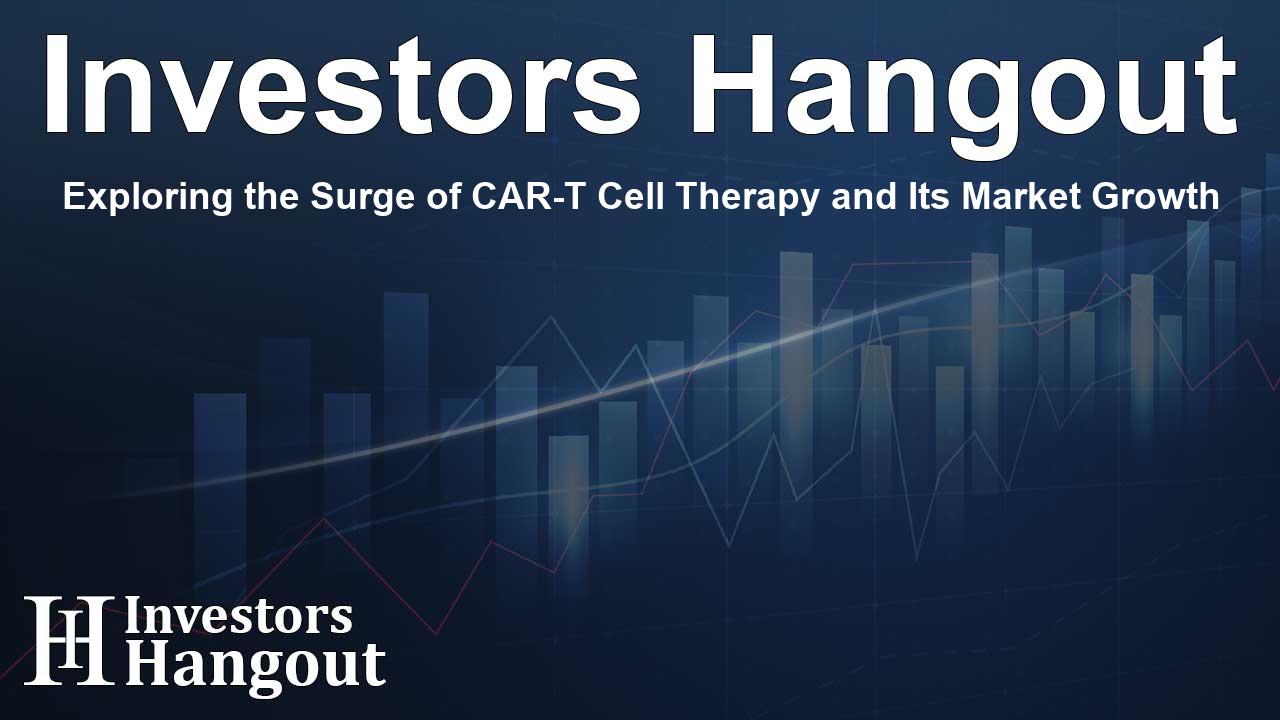Exploring the Surge of CAR-T Cell Therapy and Its Market Growth

Understanding the CAR-T Cell Therapy Market
The global CAR-T cell therapy market is on an impressive trajectory, anticipated to soar to USD 217.6 billion by 2035 at a remarkable compound annual growth rate (CAGR) of 39.75%. This growth, driven by advancements in personalized medicine, addresses a crucial demand stemming from the increasing prevalence of cancer worldwide.
Why CAR-T Therapy is Gaining Ground
CAR-T therapies have shown remarkable promise in treating various hematologic cancers, including leukemia and lymphoma. As research evolves, the focus is expanding to therapeutic applications for solid tumors, representing a new horizon in cancer treatment strategies.
A Shifting Perspective on Treatment
According to industry experts, the conventional narrative centered around CAR-T’s role in blood cancers is morphing. This innovative approach is transitioning from being viewed as a last-resort measure to a mainstream precision therapy with extensive treatment potential.
The Impact of Ongoing Clinical Studies
Researchers are closely monitoring over 1,000 global clinical trials that explore CAR-T therapy applications beyond hemato-oncology. This landscape presents essential insights for biopharma strategies, facilitating informed decision-making in an evolving market.
Key Factors Fueling Market Growth
Rising Cancer Incidence
The alarming projections indicate that by 2040, global cancer cases may exceed 28 million annually, underscoring the urgency for innovative treatments such as CAR-T therapy. With hematologic cancers showing impressive response rates, CAR-T cell therapies are increasingly seen as vital life-saving interventions.
Regulatory Approvals and Pipeline Developments
A positive regulatory environment is fueling the development of CAR-T therapies. Approved products, including Kymriah and Yescarta, have set the stage for broader acceptance. Furthermore, the rise of active clinical trials for solid tumors showcases robust pipeline potential, enabling expanded applications for this treatment modality.
Investments and Innovations
Major pharmaceutical firms are allocating extensive investments toward research and development of CAR-T treatments. This commitment not only amplifies the therapeutic options available but also fosters strategic collaborations between innovative startups and established academic institutions, leading to breakthroughs in product design.
Leading Players in the CAR-T Market
Prominent Companies Making an Impact
The CAR-T cell therapy landscape features several key players driving advancements. Companies like Novartis and Bristol Myers Squibb are making significant contributions, enhancing both R&D efforts and manufacturing capabilities. These strategic initiatives are vital to meeting the increasing demand for CAR-T therapies.
Recent Developments Shaping the Industry
In recent months, the CAR-T market has seen notable advancements. Regulatory approvals for new therapies such as Aucatzyl highlight the momentum within the industry. Additionally, acquisitions, like Bristol's planned acquisition of 2seventy Bio, demonstrate the convergence of market players to enhance synergy and innovation.
Market Challenges and Opportunities
Cost Constraints and Accessibility
High treatment costs, ranging from USD 350,000 to USD 500,000, present substantial challenges, particularly in low- and middle-income regions. These costs not only limit accessibility but also intensify pressures on healthcare systems, necessitating innovative cost-reduction strategies.
Health Risks and Safety Considerations
While CAR-T therapy exhibits high efficacy rates, it is essential to acknowledge the potential side effects, including cytokine release syndrome. Healthcare infrastructure must be adept at managing these risks to foster broader adoption across hospitals.
Regional Landscape of CAR-T Cell Therapy
The North American market remains the most developed CAR-T therapy sector, driven by regulatory advantages and extensive research initiatives. Globally, regions such as Europe and the Asia-Pacific are experiencing evolving trends, with emerging markets actively engaging in clinical trials to enhance treatment access and efficacy.
Frequently Asked Questions
What are the expected trends for the CAR-T Cell Therapy Market?
Innovations in CAR-T technology, increasing regulatory approvals, and expanded applications in solid tumors are expected to drive market trends.
Which region holds the largest market share for CAR-T Therapy?
North America, particularly the United States, is currently the largest and most advanced market for CAR-T therapies.
What is the primary application of CAR-T therapies?
CAR-T therapies are predominantly used in treating hematologic cancers like leukemia and lymphoma, showing substantial clinical efficacy.
What is the market size forecast for CAR-T therapies?
The CAR-T therapy market is projected to reach USD 217.6 billion by 2035.
Who are the main competitors in the CAR-T market?
Key players include Novartis, Bristol Myers Squibb, Gilead, and other leading pharmaceuticals, all contributing to significant market advancements.
About The Author
Contact Dominic Sanders privately here. Or send an email with ATTN: Dominic Sanders as the subject to contact@investorshangout.com.
About Investors Hangout
Investors Hangout is a leading online stock forum for financial discussion and learning, offering a wide range of free tools and resources. It draws in traders of all levels, who exchange market knowledge, investigate trading tactics, and keep an eye on industry developments in real time. Featuring financial articles, stock message boards, quotes, charts, company profiles, and live news updates. Through cooperative learning and a wealth of informational resources, it helps users from novices creating their first portfolios to experts honing their techniques. Join Investors Hangout today: https://investorshangout.com/
The content of this article is based on factual, publicly available information and does not represent legal, financial, or investment advice. Investors Hangout does not offer financial advice, and the author is not a licensed financial advisor. Consult a qualified advisor before making any financial or investment decisions based on this article. This article should not be considered advice to purchase, sell, or hold any securities or other investments. If any of the material provided here is inaccurate, please contact us for corrections.
